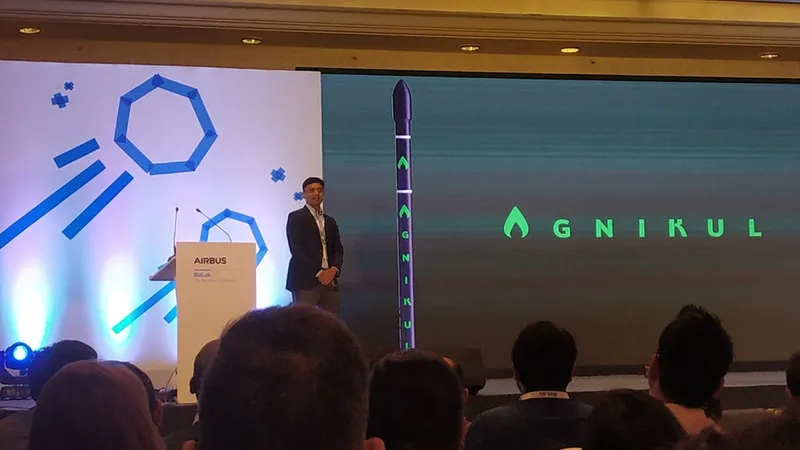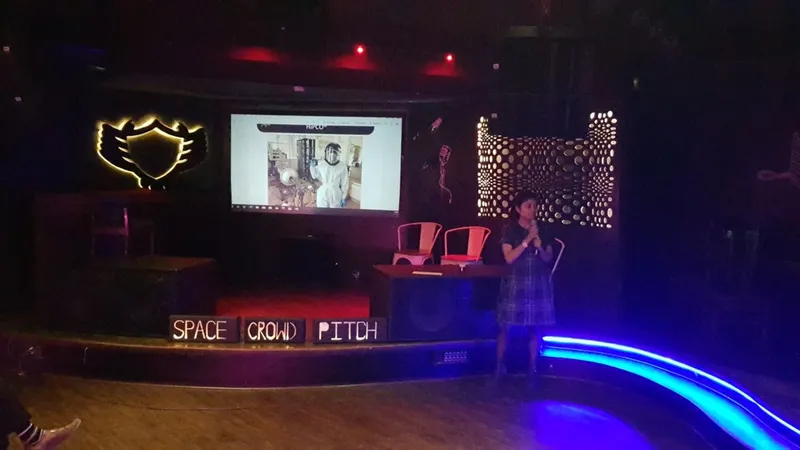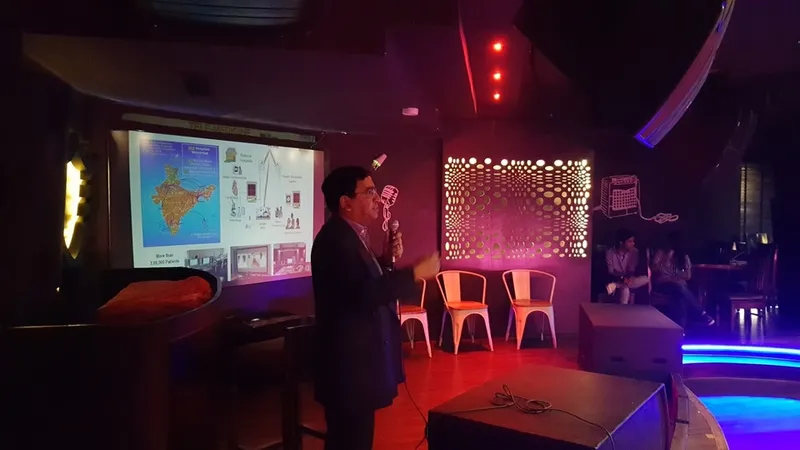What does it take to (re)create the future of Space from India? 8 Takeaways from the SpaceTech Startups community
As part of the SpaceTech Startups (STS) community, the first-ever Space Crowd Pitch took place in Bengaluru on March 28, 2019. The event brought together Space startup founders, sector-focused investors, subject-matter experts, ecosystem leaders, and engineering talents. Themed Accelerating into the World of Space, the event’s panel sought to address what would it take to build the future of Space from India. The community reconnected a week later, during Airbus Bizlab TakeOff 2019 in Bengaluru, and with plans of more such learnings and gatherings across other cities.

Investors on SpaceTech Startup Trends
The recent months have seen extensive coverage of India’s Space technological developments, leading to the country now being labelled a ‘Space Power’. The excitement is palpable, especially among the student community. In a recent campus poll conducted by Crowd Product, we had an overwhelming number choose SpaceTech as their dream career, followed by Robotics and Electric Vehicles.
Like many of you may have, I too grew up being fascinated by the world of Space and by keenly following scientists like Yash Pal and their celestial activity discussions on the national television. I have also had the opportunity to research on the sector during my coverage of India’s first lunar mission, Chandrayaan-1, back in 2008 for Yahoo! Space, being such a vast domain, can easily overwhelm potential innovators.
In this post, I am sharing with you some learnings from Space startups, investors, and the ecosystem leaders.
Srinath Ravichandran, Agnikul Cosmos

The startup is building a mini launch vehicle, enabling rockets of up to 100kgs to low earth orbit. Their goal is to facilitate the launch of micro and mini satellites on-demand.
Srinath Ravichandran, Founder and CEO, Agnikul Cosmos, mentioned his team includes talents from various engineering streams - electrical engineers, propulsion engineers, structural engineers, system engineers, chip designers, software engineers, and more. And this, talking only about talents in the technology streams.
Takeaway - If you understand technology, one is never an outsider when it comes to building something in SpaceTech.
Aparna Allannavar, NoPo Nanotechnologies

NoPo Nanotechnologies manufactures space-ready Carbon Nanotubes (CNT), a material for the future of rockets. Aparna Allannavar, a scientist from the company, shared more about HiPCO technology - a process invented by Nobel laureate Richard Smalley, which aids the manufacturing of Carbon Nanotubes. She also explained about CENCE™, an enhanced sensing composite for use in Space.
Gadhadar Reddy, Founder, NoPo Nanotechnologies, studied Electrical Engineering at BMS College of Engineering, Bengaluru, which offered nanotechnology as a subject. He later went on to study Molecular Sciences and Nanotechnology at Louisiana Tech University. There, he was able to convince Robert Kelly Bradley, co-inventor of HiPCO reactor, to join him in his vision to make humanity a space faring species.
Also Read: For this Bengaluru startup, all roads lead to Mars
Takeaway - Being a lifelong learner and willing to collaborate can go a long way in helping one realise objectives. The Space Technology sector is no different.
Vishesh Rajaram from SpecialeInvest
Developments in the SpaceTech domain are going to increase multifold, given that governments are acting towards privatisation of the sector. Vishesh sees three overarching trends that will drive increased innovations in Space - Cost of satellite launches coming down drastically, decrease in the size of satellites, and increase in computation power.
Takeaway - There are focused investment funds who understand the Space sector well, and who are willing to assist innovators with funding and other insights.
Rama Bethmangalkar from Qualcomm Ventures
Rama estimates there are 1,500 to 2,000 companies across the world that are into SpaceTech, with 250-300 already being venture funded already. He says, sometimes commercial grade or even military grade products and components may not be enough for use in Space. Hence it would be important for companies to critically test solutions for Space.
Takeaway - A government-backed shared infrastructure for critical testing will reduce costs and thereby encourage more innovators start up and sustain their SpaceTech companies.
Corporate learnings from Airbus BizLab
Anand Stanley, President and MD, Airbus India and South Asia, believes the future of India does not belong to entrepreneurs or innovators, as much as it is for the rest of the 99 percent who will benefit from the innovations that entrepreneurs work on. Innovations that have made data in India 95 percent cheaper, agriculture more sustainable, infrastructure more robust, etc., have and will make a huge impact to societies.
Also Read: Airbus wants to redefine future of aviation: Anand Stanley at BizLab 2019
Takeaway - The motivation for innovators should not just be reaping monetary rewards for themselves, but also finding solutions that can make a difference to millions.
The Leader of Airbus Bizlab India, Siddharth Balachandran, did some trend spotting. He shared how the future of aerospace will enable many more companies to work on unmanned solutions like delivery drones, on emergency healthcare solutions, and even basic necessities like the internet - which will be powered by satellites. Siddharth also went on to share how satellite data and geo intelligence can avoid calamities such as the Kerala floods.
Takeaway - There are several use-cases that can be addressed by leveraging latest technology and developments in the aerospace industry.
More Learnings from Innovation-led Community
Global Navigation Satellite System (GNSS)

As explained by Varadarajan Krish, GNSS is the standard term for satellite navigation systems. The technology can deliver a user’s latitude or longitude position in quick time and across the globe. GNSS accepts various global positioning systems, including the popular GPS (Global Positioning System) developed by the US government. The GNSS systems developed by other regions, are GLONASS (Russian), Galileo (European), BeiDou (Chinese) and IRNSS (Indian).
Takeaway - GNSS opportunities are huge, with the market driven not just by its sheer size but also modernisation plans by governments and fast growth of several industry sectors.
Licence on Transfer (LOT) Network

There is a new trend of technology startups adopting defensive patent strategies by being part of global communities. The LOT network protects companies from patent trolls or patent assertion entities. Patent trolling adds up to $80 billion of money lost, which could have instead been used for innovation, talents, and building better products. LOT members include Microsoft, Google, Facebook, SAP, NetApp, Salesforce, Cisco, Logitech, and other corporations in the automotive, financial, entertainment, etc. Startups here are able to leverage from the over 1.5 million patent assets available in the network.
Takeaway - There are networks and communities created to protect innovators, and when in danger of losing their time and money.
There were other useful takeaways from leading ecosystem attendees at the event. For instance, Vijetha Shastry, Lead, Open Innovation at NASSCOM Centre of Excellence for IOT, reinforced the belief that a lot of growth in innovative startups that we see today could not have happened in isolation. Right from contributions from varied talents to technologies like 3D printing – they have all made a crucial difference to the realisation of opportunities.
Finally, answering the question of ‘What does it take to build the future of Space from India?’
‘It’s the Community’, as shared by Space Pitch panel discussion’s moderator, YourStory's Madanmohan Rao, and reiterated by other Space Pitch event delegates like Futurist and Chair TiE IoT Forum, Arvind Tiwary. The future of Space may well come from a region that engages innovative startups, talents, and global stakeholders, even more productively.
(Disclaimer: The views and opinions expressed in this article are those of the author and do not necessarily reflect the views of YourStory.)







